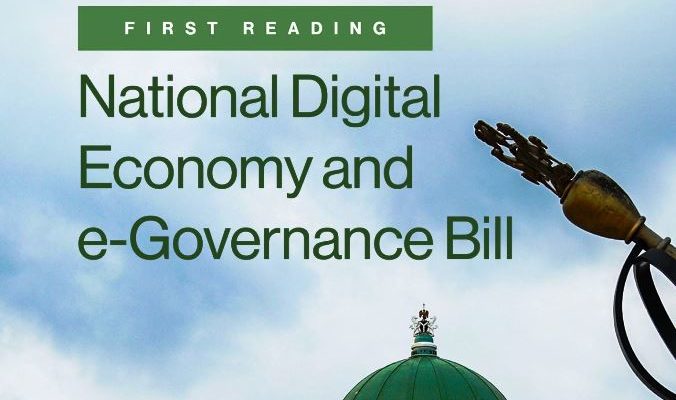By Osasómé C.O
The National Digital Economy & e-Governance Bill has successfully passed its first reading in the National Assembly, marking a significant step forward in the Nigerian government’s efforts to create a structured environment for the digital economy and e-governance.
RELATED: Nentawe Yilwatda outlines seven steps to optimizing opportunities in 4IR and Nigeria’s digital economy
“This will be the first of a series of engagements by the leadership of the Senate Committee on ICT & Cybercrimes, led by Senator Shuaib Afolabi Salis, and the House Committee on Digital & Information Communication Technology, led by Rep. Stanley Adedeji Olajide, in collaboration with the Federal Ministry of Communications, Innovation & Digital Economy,” stated Dr. Bosun Tijani, Minister of Communications, Innovation & Digital Economy, in a recent post.
Dr. Tijani also announced plans for a “first stakeholder engagement event, specifically for the media, on Tuesday, July 9, 2024, in Abuja.”
Meanwhile, the House of Representatives Committee on Digital and Information Communication Technology has announced a stakeholder meeting on Tuesday to discuss the development of a national digital economy. The meeting will include active participation from the media and will focus on the National Digital Economy and e-Governance Bill currently under consideration by the National Assembly. The event will be hosted by the House Committee in collaboration with the Senate Committee on ICT and Cyber Crimes, chaired by Senator Shuaib Salisu.
The National Digital Economy & e-Governance Bill is poised to significantly transform Nigeria’s digital landscape, fostering sustainable economic growth, enhancing public services, and promoting an inclusive digital society.
The bill sets a solid foundation for Nigeria to thrive in the digital age, ensuring sustainable development and a competitive edge in the global market.
Key Benefits of the Bill:
- Enhanced Digital Infrastructure: The bill aims to expand and modernize ICT infrastructure across the country, ensuring better connectivity and access to digital services. It is expected to increase investment in broadband and internet services, significantly improving internet penetration rates, especially in rural and underserved areas.
- Economic Growth and Job Creation: By promoting digital services and e-commerce, the bill will boost the digital economy, stimulate economic growth, and create new job opportunities in the tech sector. It will provide a robust digital economy framework to attract foreign investment into Nigeria’s tech ecosystem, fostering innovation and entrepreneurship.
- Efficient Public Services: The bill aims to streamline government processes, reduce bureaucracy, and improve service delivery to citizens.
- Transparency and Accountability: Digital governance tools will enhance transparency and accountability in government operations, reducing corruption and improving public trust.
- Increased Access to Digital Services: Citizens will be able to access a wide range of government services online, improving convenience and efficiency.
Other benefits include:
- Inclusion of Marginalized Groups: Digital platforms will help include marginalized and underserved populations in governance processes and economic activities.
- Strengthened Cybersecurity Framework: The bill will establish stronger cybersecurity measures to protect digital infrastructure and data, safeguarding against cyber threats.
- Data Protection and Privacy: Enhanced regulations will ensure better protection of personal data, boosting confidence in digital transactions and services.
- Promotion of Innovation and Digital Skills Development: The bill will encourage the development of new digital products and services, fostering a culture of creativity and technological advancement.
- Digital Literacy and Skills Training: Initiatives under the bill will promote digital literacy and provide training programs to equip citizens with necessary skills for the digital age.
- Data-Driven Decision Making: e-Governance tools will provide data analytics capabilities, enabling data-driven policy making and informed decisions by government officials.
- Interagency Collaboration: Improved digital infrastructure will facilitate better collaboration and communication between different government agencies, enhancing overall governance efficiency.
- Enhanced International Competitiveness: By adopting global best practices in digital economy and e-governance, Nigeria will enhance its international competitiveness and integration into the global digital economy.
- Participation in Global Digital Initiatives: The bill will position Nigeria to participate more actively in international digital initiatives and partnerships, driving further growth and innovation.

































